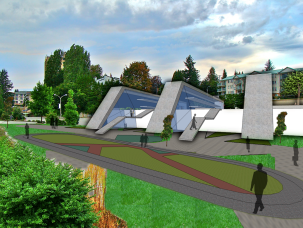By Grace Romund (The Cascade) – Email
Print Edition: January 11, 2012
 We have all seen them – the run down, boarded up, under used eye sores that are old strip malls. The City-Region Studies Centre at the University of Alberta is making strides to counteract the blight of the small strip mall. Strip/Appeal is an architecture and design competition hosted by the University of Alberta intended to showcase innovative ideas of how to reinvent and reuse small strip malls.
We have all seen them – the run down, boarded up, under used eye sores that are old strip malls. The City-Region Studies Centre at the University of Alberta is making strides to counteract the blight of the small strip mall. Strip/Appeal is an architecture and design competition hosted by the University of Alberta intended to showcase innovative ideas of how to reinvent and reuse small strip malls.
Scott Varga, UFV alumni and media technician of the Educational Technology Services department at UFV submitted his own design concept based on an old small-scale strip mall in historic downtown Abbotsford.
Varga explained, “I was inspired to submit my own design because as a new resident of Downtown Abbotsford I felt that the Dollar Tree (ex-SuperValu) strip mall was a perfect metaphor for where our North American consumption-driven planning ideology has led us – to vacant, underutilized, and inefficient spaces.” He added, “I felt that if my concept could gain some sort of traction nationally, perhaps the momentum could then be carried into realized change for the betterment of the Fraser Valley.”
The participants were required to identify an “ailing” strip mall in their local areas and aesthetically recreate and rejuvenate the under achieving space. Varga’s is one of 20 designs shortlisted as potential winners of the Strip/Appeal competition. Eventually the University of Alberta plans on turning some of the designs submitted into a travelling exhibit intended to stimulate discussion of creative alternatives to dismally unused strip malls in design and architecture schools across North America.
“The title of my design is REconnect, so I focused on reconnecting the architecture to the topography and people to the architecture. This approach led me to reconsider the current planning and urban design framework so I decided to create a new ideology that includes building on, in, with, around, over and under the existing structure to create a symbiosis of old and new and a strati?cation of our design history. Rather than bulldoze our mistakes we must encapsulate them as monuments to ensure they are never repeated.”
Varga presents his design concept primarily in the form of a five-minute video presentation accompanied by a couple written paragraphs to further illustrate his vision. Other shortlisted competitors used storyboard panels and elaborate diagrams to feature their designs. A common thread between many of the designs is sustainability. The organizers of the competition specified in their submission guidelines that the designs must promote sustainability as well as walkability.
“Sustainability should be a key element in every choice we make, not just construction,” Varga emphasized. “We all understand that by building green in new construction we are still extracting scarce resources no matter how many LEED points we receive for the materials. REconnect looks at sustainability from a social context (to me social sustainability and economic sustainability are closely related): relationship development in urban gardening and food security by creating more effective use of roof space with economic spin off opportunities; the creation of public space for people to congregate and engage in expressions of physical activity that rebel against the suburban proliferation of inactivity caused by the automobile; a revised positive identity created through form of place that engages all who visit and creates a destination, thereby encouraging enterprise in the neighbourhood.”
The winners of the Strip/Appeal competition will be announced on January 16. The first prize winner will receive $1000.

